
FRESNO
DESK - The
Republican Newspaper first appeared in the year
1824 in Springfield, Mass. Its founder and publisher was Samuel
Bowles(1797-1851).
Alexis de Tocqueville actually met Samuel Bowles when the young
Frenchman visited the offices of the Springfield Republican
in 1832 on his American tour. After the meeting with Bowles,
Tocqueville wrote in his diary 'I am of the opinion...that
what best explains the enormous circulation of the daily press
... is that among the Americans I find the utmost national freedom
combined with local freedom of every kind.'
Bowles' son, Samuel Bowles(1826-1878) began work for his father
as a copy-boy at the age of 17. After the elder Bowles died in
1851, the younger Samuel Bowles took on the role of publisher.
With a small dedicated staff, Bowles made the Republican one
of the half-dozen most influential newspapers in the United States.
Bowles single-handedly welded antislavery public opinion
in the young nation into the conservative Republican Party
of his day. He gave complete support to Abraham Lincoln and
through hard-hitting and relentless editorials and opinion pieces
the Republican condemned political and financial corruption
in the White House, in Congress, and in the Courts.
The historic work, Democracy in America, by Alexis de
Tocqueville chronicled the impact that newspapers like the Republican
had in shaping America's unique political character.
The antecedent Springfield Republican's original purpose
was chiefly the analysis and public discussion of political economics.
Today's Fresno
Republican Newpaper Co.[1876] is its modern West Coast descendant
and exemplar.
[Editor's Note: The Fresno Republican was established
in September, 1876, by Dr. Chester A. Rowell, who had associated
with him George McCullough and Lyman Andrews, M. J. Donahoo, Frank
Dusy, A. Tombs, J. W. Williams, C. W. DeLong, Russell Flemming,
Cottled, Luse and some other gentlemen, Republican in politics.
The first editor was Emmett Curtis, a
young journalist who had been brought hither from San Francisco.
The first issue made its appearance on September 23, 1876, and
being the first Republican paper ever issued in the county, created
somewhat of a sensation.
Seven hundred and fifty copies were issued,
and a copy sent to every known Republican in the county, and seems
to have made a favorable impression. Mr. Curtis remained in editorial
charge until after the presidential election of that year, when
it was found that if the paper were to be continued, the expenses
would have to be very materially reduced.
It was $800 in debt, had practically
no subscription list, and a very limited advertising patronage.
The election was over, the politicians was apathetic, and Republicans
refused to contribute to sustain the paper. Dr. Rowell now assumed
the personal management, dispensing with the services of an editor,
discharging all help not absolutely necessary to the production
of the paper, temporarily postponing the indebtedness with new
notes, and turning in his personal medical accounts ,to assist
in the support of the enterprise.
It was a very hard struggle, but the
paper never lost an issue, though it was kept alive only by constant
self-sacrifice, and the continual making good of deficiencies.
On September 28, 1878, Dr. Rowell gave the Republican into the
charge of Clarence Hedges and William Shanklin, two printers who
had been identified with the office almost from the beginning
of its publication.
They continued as editors and publishers
until April 26, 1879, when Dr. Rowell sold the paper to S. Adison
Miller, stipulating, however, that it should remain a strictly
Republican paper, that it should always be known as the Fresno
Republican, that it should in no way amalgamate with or enter
into any agreement of business or politics with its rival, the
Fresno Expositor, nor change its policy in any respect relative
to public matters.
Under Mr. Miller's management the Republican
steadily advanced and enjoyed an era of unusual prosperity, bringing
to its owner a very comfortable fortune. In 1885, Mr. Miller sold
the property to the Rev. Mr. Brewington, who conducted it for
six months, when he sold it to J. H. Short and J. W. Shanklin,
who devoted most of their efforts to the daily issue.
In May, t 890, Messrs. Shanklin and Short
transferred their interest, which included the entire plant, to
T. C. Judkins, who increased its news service and generally placed
it upon a higher plane of journalism.
It is publishing the full dispatches
of the Associated Press, and is the equal of any morning newspaper
in the State outside the City of San Francisco. It continues to
be an aggressive Republican newspaper, though it treats all parties
with fairness and liberality.
It is outspoken and independent, and
does not hesitate to commend or condemn officials of any party.
It has not enjoyed any official, patronage and has succeeded entireiy
on its own merits.]
The California Republican Party
did not have a friendly newspaper with which to fight creeping
Federalism invading state's rights as Theodore Roosevelt championed
the cause of the Republic.
Meanwhile, Federalism was making its
last-stand in back-country districts. The Springfield Republican
endorsed John Quincy Adams(R) for president and achieved modest
success. By 1846, with the coming of the electronic telegraph,
it took on a new life and became distinguished in its literary
quality, fiction serials, and history departments as well as its
editorial policy.
In 1856, editor Horace Greeley, wrote
in the Springfield Republican 'It is the best and ablest
country journal ever published on the continent.' One of the outstanding
features of the Republican was its concise writing and
condensation.
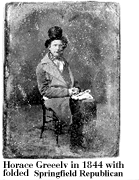 Although the daily
Republican helped to create the new Republican Party it
has always remained an independent force in political thought.
Although the daily
Republican helped to create the new Republican Party it
has always remained an independent force in political thought.
The historic Springfield Republican
eventually was recast as a weekly known as the Fresno Republican
in the California wild and rugged frontier town of Fresno in February
1877 by Dr. Chester Rowell & A.L. Hobbs. Its original purposes
were renewed as it played a key role in establishing the California
Republican Party.
In July 1892 it became a daily and changed
its name to The Fresno Morning Republican and remained
independent until November 1926 when The Fresno Morning Republican
was sold. But, in the early years, the Fresno Morning Republican
Newspaper was a financial success, due in no small measure, to
the managing expertise of William Glass.
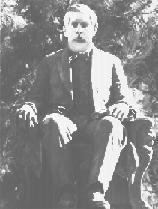 William Glass was a native of New York, arriving in Fresno in
1890. Hired immediately by Rowell, Glass was onboard as Fresno
Morning Republican's business manager. Glass was born at New
York City on March 22, 1860, the son of John Glass and Margaret
(Hart) Glass. The Glass heritage was distinguished in classical
learning and the fine arts. The Harts numbered in the ranks
some famous persons in letters and art, at the law and on on
the battlefield and in publishing enterprises.
William Glass was a native of New York, arriving in Fresno in
1890. Hired immediately by Rowell, Glass was onboard as Fresno
Morning Republican's business manager. Glass was born at New
York City on March 22, 1860, the son of John Glass and Margaret
(Hart) Glass. The Glass heritage was distinguished in classical
learning and the fine arts. The Harts numbered in the ranks
some famous persons in letters and art, at the law and on on
the battlefield and in publishing enterprises.
William Glass had matriculated at the
NY Cooper Institute, a part of the Cooper Union for the Advancement
of Science and Art. Mr. Glass had worked as a bookkeeper for
a stockbroker in New York City, and in 1882 became cashier in
a stockbroker's office.
An opening as purser on a Pacific Coast steamer,
the following year, eventually led to Glass taking a job with
the San Francisco Bulletin from 1883 to 1890 where he demonstrated
his ability to adapt himself fully to the more exacting conditions
of the newer, bustling western life and relocation to Fresno.
Beginning in 1890, Mr. Glass directed
the affairs of the Fresno Republican's counting room, and his
past experience, together with his admirable foresight, helped
make the Fresno Republican Newspaper one of the best in California
and eventually in the United States.
Dr. Chester Rowell & A.L. Hobbs
together with William Glass were the team making the Fresno
Morning Republican quite as valuable an organ for the public
weal as its namesake, the Springfield Republican, so long proved
to the great commonwealth of Massachusetts.
With the entry of the nation on its
second century, in 1876, the Weekly Republican was established
as the proper expression of the new life and enterprise developing
here; and in 1887 the Morning Republican became a reality, and
has ever since continued the exponent of Fresno and its unrivaled
county.
More than that, it has proven the faithful
expositor of conditions in the San Joaquin Valley, and with
its Associated News service has enabled the patrons, scattered
in towns and on outlying ranches, to keep in close touch with
the pulse of the country at large.
Mr. Glass was active in local civic
affairs ass president of the Chamber of Commerce and a member
of the Commercial and Rotary Clubs. He was a member of the Promotion
Committee of the Raisin Exchange, out of which grew the California
Associated Raisin Company. He was chairman of the Promotion
Committee of the California Peach Growers, Inc., and he represented
the State of California on the Board of Directors of the San
Joaquin Valley Milk Producers Association.
He served as president of the Fresno
County Welfare Department, and chairman of the Fresno Chapter,
American Red Cross. He was chairman of the Odd Fellows Hall
Company, treasurer of St. Paul's M. E. Church, South, and secretary
of the Fresno Republican Publishing Company. He has been a trustee
of the Fresno Public Library. Note: At San Francisco, on January-17,
1884, Glass married Miss Theresa McKittrick, the daughter of
Edward McKittrick, a well-known early Californian pioneer.
Two children have blessed this fortunate
union a son, Edward Glass, and a daughter, Emma Theresa. In
1919 Fresno architectictural firm of Edward Glass and
Charles Butner were hired to design and plan the Fresno Republican
Pruntery Building at 2120 Kern Street to handle all the job
printing of the Fresno Morning Republican newspaper.
The family attended St. Paul's Methodist
Church.. Glass was made an Odd Fellow at Occidental Lodge, San
Francisco, on August 6, 1886; and in 1888 was Noble Grand. He
was Chief Patriarch of Fresno Encampment, 1910, Commandant of
the Fresno Canton, 1909, and Chairman of the Fresno General
Relief Committee, 1899.
In 1877 it had begun with a hard-hitting
series of editorials promoting public accountability for soaring
taxes and increasing Federalism and soaring National Debt. At
that time the national debt was then only a paltry $3,352,380,410.
That debt mostly due to the destructive
economic effects on productivity and rampant inflation resulting
from the cumulative unpaid costs of fighting the Civil War by
the United States Government.
Since the year 1887 the taxpayers of
the United States have attempted to reform Congress' wayward
tax and spend habits. By 1999 the National Debt exceeds $5.935
trillion. There is good reason to continue and to perpetuate
a historic Republican Newspaper publisher's vision as
the world moves cautiously into another new world at the millennium
and beyond.
By 1996 the William Clinton presidency
with the cooperation of a Democrat Congress pushed the Nation
headlong into another implacable period of populist tax &
spend fiscal irresponsibility.
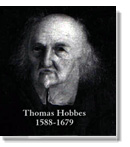 Today's national Fresno
Republican newspaper traces its conservative editorial policy
originally established by Samuel Bowles as based on the civil
economics philosophy of Thomas Hobbes 1588-1679 [Richard Hofstadter,
The American Political Tradition and the Men Who Made It,
pp.3,5,16,356. Random House, New York, 1948.]
Today's national Fresno
Republican newspaper traces its conservative editorial policy
originally established by Samuel Bowles as based on the civil
economics philosophy of Thomas Hobbes 1588-1679 [Richard Hofstadter,
The American Political Tradition and the Men Who Made It,
pp.3,5,16,356. Random House, New York, 1948.]
In another historical sidebar, the early
history of California was written by ancestors of the Republican
Newspapers' owners & publishers. Orrin E. Smith was a
member of Samuel Brannan's Early California pioneers. These men
were members of the Mormon group from Illinois who were the first
English speaking residents of Yerba Buena (San Francisco).
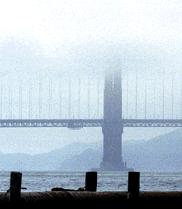 The party arrived in San Francisco
Bay aboard the ship Brooklyn on July 31th in the year 1846.
The ship had carried the pioneers all the way from New York harbor,
a journey of 24,000 miles. The site of the landing was near what
is now the Hyde Street Pier close to an old Mexican Fort.
The party arrived in San Francisco
Bay aboard the ship Brooklyn on July 31th in the year 1846.
The ship had carried the pioneers all the way from New York harbor,
a journey of 24,000 miles. The site of the landing was near what
is now the Hyde Street Pier close to an old Mexican Fort.
Brannan brought with the pioneer party
many advanced technological inventions never seen in early California.
One if these advances was the portable Franklin printing press.
Brannan intended to establish the first English newspaper on the
Pacific Coast. Samuel Brannan, with the assistance of Orrin Smith
operated the press in a second-story loft & grist mill on
Clay Street in early San Francisco. They opened a printing business,
and began writing and publishing the newspaper called California
Star.
The California Star newspaper
was sold on street corners in what is now San Francisco and was
dispatched by ship in the earliest mail to the Eastern Seaboard
and to the British Isles. Smith & Brannan told readers that
California was a "haven of opportunity".
After the discovery of gold in 1849 California
Star became the voice of San Francisco and of the Pacific
Coast. Largely through breaking the news of the gold strike to
the world the California Star gained prominence throughout
a world eager to learn.
The gold strike caused a sudden population
growth and wild prosperity in California. The size of the population
increased twelve-fold in a single year.The publishers of the California
Star soon had a thriving economic enterprise, expanding to
meet the needs of the growing community. [Chas. Dobie, San
Francisco: A Pageant, pp.95-109. Appleton-Century Co., London,
1933.]
The early history of the Republican
newspaper is tied up with the 16th President of the United
States, Abraham Lincoln(R) 1861-1865. Lincoln was the founder
of the modern Republican Party in America. The owners of
the national Daily Republican newspaper are paternal descendants
of the Thomas Hobbes(English philosopher) family, and maternal
descendants of the Nancy Hanks Lincoln's mother)and maternal descendants
of the Orrin E. Smith (California pioneer of 1846).
The historic Fresno weekly Republican
newspaper was sold by newsboys on the corner of Fresno Street
and Van Ness Avenue, at five cents per copy. One of the Fresno
Republican news boys, Niels
Thomsen has chronicled that early experience in Fresno together
with his later voyages around the world prior to WWII and his
heroic exploits in defense of this nation. His latest work Voyage
of the Forest Dream is an exciting glimpse.
The subsequent news organization known
as the Fresno Morning Republican Although the Republican
Newspaper was sold in 1926 to C.K. McClatchy it continued to operate
successfully until it's presses were shut down in 1932 and all
the Republican subscriber lists were handed over to the Fresno
Bee Newspaper in a stealthy move which has long been remembered
as The Sting of the Bee.
The historic archives of the Fresno Morning
Republican are still available on microfilm and may be
viewed at the California History section of the Fresno County
Main Library and at the Henry Madden Library photomicrography
services at Fresno State University, Main Campus. The original
plates of the newspaper are preserved by the Fresno County Historical
Society.
The modern incarnation of the Springfield,
Mass. Daily Republican newspaper was reorganized in 1981
and founded on graphical interface engineering. It has technically
evolved since them, and now uses powerful JAVA Scripting, SHOCKWAVE
& CGI programming with the latest versions of Internet and
World Wide Web browsers like Netscape, Microsoft Internet
Explorer, AOL, and COMPUSERVE with multimedia plugins for
video, graphics and streaming audio.
The national edition of The Daily
Republican Newspaper has been featured on C-SPAN for
the newspaper's public affairs service, news, and political opinion
in recent years. The Daily Republican online newspaper
has also received recognition in the Hall of Fame, C-Site
permanent award. The Daily Republican is the 1995 recipient
of the Gold Medal In Journalism for Best News Publication
on the Internet! The historic Atlantic Monthly Magazine
selected the Daily Republican as its political information
site in 1996.
Two of Fresno's early Republican Party
pioneers were physician, Chester H. Rowell, from Denver and school
teacher, Albert Lincoln Hobbs from Springfield and Boston, Mass.
Hobbs was the descendant of 16th Century English philosopher Thomas
Hobbes. Albert Lincoln Hobbs would be the founder of a fruit packing
and shipping company and the Chairman of the Fresno County Central
Committee and of the California Republican Party. His wife
Mrs. Alice Hobbs was among the original founders of Fresno's First
Presbyterian Church. Mr. Hobbs and Dr. Rowell would become the
original investors and founders who would publish the widely acclaimed
The Fresno Republican weekly newspaper in 1877.
In 1854 the modern Republican Party appeared
in American politics as a transformation of the Whig Party. The
first Republican president was Abraham Lincoln (R) 1861-1865.
In 1858 the town of Fresno was founded
on only 50 residents. By 1876 Fresno had more than 3,000 itinerants
and property owners. Dr. Chester Rowell arrived in that year and
started the Republican newspaper partly in response to the civil
strife he witnessed upon arrival. Fresno was by then a liberal,
brawling, rowdy, Libertine, and wide-open frontier town of bawdy
houses, saloons, cattle men, Sequoia logging mill workers, gold
miners, gamblers, and railroad speculators.
Town government was ineffective, its officials
were naive, illiterate, and lacked any interest in maintaining
law and order. Graft, bribery, and corruption controlled City
Hall. Citizens were apathetic and were even afraid to be on Fresno
City streets after dark.
However, the powerful influence of the
ideas and editorials published in the Republican newspaper
appealed to Fresnans to establish peace and insure the safety
of its people and their property in order to establish a social
and economic foundation for growth and property.
Dr. Rowell's brother was a congressman
in Washington whose son was Dr. Rowell's namesake. The younger
Chester H. Rowell served as a Committee Clerk in Congress for
his father after graduating the University of Michigan. He then
took two years of post graduate studies at the University of
Berlin before teaching college Latin, German, and French,
in Baxter, Kansas.
On October 12, 1885, the Fresno City Township
was incorporated. In 1895 young Rowell was hired by C. L. McLane,
Fresno City School Superintendent for a teaching position at the
115 student, Fresno High School. Young Rowell was among its first
five teachers.
Three years later, the younger Chester
Rowell accepted the job as Editor of the Republican from
his Uncle Chester Rowell. The name on the masthead was soon modified
as the Fresno Morning Republican . The younger Rowell soon
became well-known throughout the Nation as a crusading young journalist-editor
attempting to cleanup Fresno's image of political graft and crime.
He went after a change in the General Law for Cities of the Fifth
Class.
Fresno operated without a Mayor under
that law. Town government had been weak and run by five trustees.
The Fresno Morning Republican campaigned for election of
literate community leaders with commitment to limited government
clean streets and a responsible business community.
A. Lincoln Hobbs, President and Manager
of the successful corporation, Hobbs Parson's Company, was an
international fruit shipper, President of the Fresno Chamber of
Commerce, an educator, and was impressed with Rowell's editorials
in the Fresno Morning Republican and his community leadership
in getting a new Charter for Fresno City.
Hobbs nominated Chester Rowell for Mayor
of Fresno City. Rowell did not seriously accept the nomination
but sought changes in the form of City government from behind
the Editor desk. In 1902, Fresno voters approved the new City
Charter, and elected their first mayor, Mr. L.O. Stephens.
Chester Rowell and A. Lincoln Hobbs became
Charter Founders in 1890 of the Progressive Republican Lincoln
Roosevelt League in California. During the 1890s both major
parties were hurt by the rise of agrarian protest, but infighting
proved most divisive among the Democrats; their collapse at the
polls followed in 1896. Beginning in that year, increased voter
strength made the Republicans the majority party in the Unites
States for the next 25 years.
Party factionalism continued: Beginning
in the 1890s Hobbs and Rowell led a group of Republicans known
as the Progressives sought to balance the party's commitment to
the industrial elite with the use of federal power to correct
some of the worst excesses of the Southern Pacific Railroad monopoly
and similar corporation trusts that dominated the political economy
of California.
The former Republican president, Theodore
Roosevelt, who had promoted some progressive measures while in
office, later became the presidential candidate of a third party,
the Progressive (Bull Moose) Party after the tumult of the Chicago
Republican Party Convention.
Hobbs invited Theodore Roosevelt to Fresno
and drove the automobile carrying the former president in a Van
Ness Avenue Bull-Moose Party rally and Parade.
Hobbs and Rowell were the sponsors of
the original state campaign for obtaining the direct primary in
California under which the Bull Moose Party became qualified.
Rowell and Hobbs also played a key role in the election of Hiram
Johnson(R) to the Office of California Governor in 1910. During
the Johnson Administration, the political power of the Southern
Pacific Railroad "octopus" was broken.
Fresno businessmen, Hobbs and Fresno
Morning Republican Editor and Publisher, Rowell developed
the maxim Vote for the Man - Not the Party! and later lived
up to that charge in gaining support for third party candidate
Theodore Roosevelt in California. The Republican Party was split
between former President Theodore Roosevelt(R) and candidate William
Howard Taft(R) after the Chicago Republican Party Convention.
Presidential candidate William Howard Taft(R) was elected in 1909.
In time, Roosevelt proved right, but the Republican Party had
sustained party disunity which led to California Governor Hiram
Johnson (R) and President Taft's defeat in 1912, to Woodrow Wilson(D).
Soon after California Governor Hiram Johnson's was also defeated.
These events led to Chester Rowell divesting himself of his financial
interest in the Fresno Morning Republican and being appointed
by President Wilson to the U.S. Shipping Board. For many years
after leaving Fresno he was the Editor of the San Francisco
Chronicle while serving on the Board of Regents of the University
of California. Chester Rowell 1867-1948, the Illinois-born editor
of the Fresno Republican (1898-1920) and the San Francisco Chronicle
(1932-1935) who later became the Chronicle's major editorial columnist
(1935-1947). Rowell used the Fresno Republican to promote the
views of the Lincoln-Roosevelt League, a Republican Party reform
organization. He received many honors in the fields of economics,
politics, peace, law, science, and sociology.
The Democrats controlled the presidency
from then until 1920, when the voters, seeking a return to normalcy
after World War I, brought the Republicans back to power under
Warren G. Harding and Calvin Coolidge.The Republican Party remained
dominant throughout the 1920s, its strength unaffected even by
another progressive defection in 1924.
Despite opposition from agricultural
and progressive Republicans, it continued to foster industrial
economic values in a time of extraordinary prosperity. Herbert
Hoover, first as secretary of commerce, then as president from
1929 to 1933, symbolized Republican commitment to unbounded national
prosperity rooted in massive industrial expansion.
The Great Depression began during Hoover's
administration. The depression severely damaged America's fundamental
belief in the dream of unlimited growth and prosperity. Trust
in the Republican party was damaged. The economic collapse and
extraordinary high unemployment that followed the stock-market
collapse in 1929 made economic history. The slow and Stoic response
of President, Hoover's administration was too little, too late.
The Democrat Party was successful in
capturing the presidency by demoting economics issues. However,
it was not successful in resolving the underlying employment problems.
Finally, the New Deal coalition,
headed first by Franklin D. Roosevelt and later by Harry S. Truman,
was boosted by a war economy that permitted political power of
the Democrat Party to remain in control of the White House for
a generation. During that time the Republican Party would lose
five presidential elections in a row. Chester Rowell died
at the age of 80,closely following the presidential election of
Harry Truman(D) in 1948.
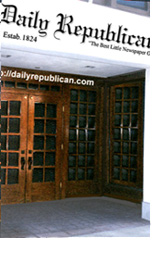 Editorial Mission
Statement: In this newspaper, the separation of news from
the editorial is intended to serve the reader, who is entitled
to the facts in the news and to opinions in the editorials. Nothing
in these functions is intended to eliminate from the news honest,
in-depth reporting, or analysis or commentary when plainly depicted
as such.
Editorial Mission
Statement: In this newspaper, the separation of news from
the editorial is intended to serve the reader, who is entitled
to the facts in the news and to opinions in the editorials. Nothing
in these functions is intended to eliminate from the news honest,
in-depth reporting, or analysis or commentary when plainly depicted
as such.
At this newspaper we never expected history to oblige our corporate
editorial policies and purposes so well. Yet, in response to publication
of the historic Republican newspaper columns and opinion
pieces, the ship of state did more than correct its course
in the early 20th Century. It reversed engines, and Communism
has now self-destructed, and the U.S. emerged unchallenged as
the world's sole remaining political and economic power.
The preeminent role played by the Republican newspaper
in all this has been reemphasized in a speech by our Economics
Editor and Acting Manager & Publisher, Dr. Howard Hobbs in
1989 on this newspaper's One Hundred Fifty-seventh Year Anniversary
Board Meeting. He said: 'The national Daily Republican newspaper,
in itself, is the most consequential statement of conservative
opinion ever made. For five generations we have been in the forefront
of the journalism movement that has transformed public policy
in California and the Nation. It has even changed the ideas, the
politics, and finally the economic policies of most of the important
international states and nations the world has known. This was
necessary to winning the most important war ever waged by any
newspaper anywhere. History has not, of course, ended even if
the historic No. 10 Web Press is now still and silent. The Daily
Republican continues in Cyberspace with the Internet Web Press
newspaper and its well chosen words now written on the very air
itself, for the entire world to read!'
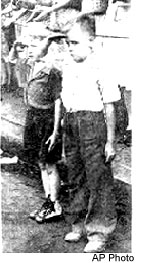 Howard Hobbs first became
known around the nation through a June 1942 AP news photo of him,
as a child on the sidelines, actively participating in a Market
Street military parade and saluting the American Flag. The story
and photo appeared in a number of national daily newspapers. [This
AP photo caption read that Howard (on right) and his friend were
attracting the attention of the crowd on Market Street as they
saluted every American Flag that passed by, even small ones on
automobiles. -Chattanooga Free Press.]
Howard Hobbs first became
known around the nation through a June 1942 AP news photo of him,
as a child on the sidelines, actively participating in a Market
Street military parade and saluting the American Flag. The story
and photo appeared in a number of national daily newspapers. [This
AP photo caption read that Howard (on right) and his friend were
attracting the attention of the crowd on Market Street as they
saluted every American Flag that passed by, even small ones on
automobiles. -Chattanooga Free Press.]
 Howard shown here in
a 1955 combat Fleet Marine Force photo, was a 1953 Fresno High
School grad who enlisted in the Marines and became the youngest
Company Sgt. serving in Fleet Marine Force units in the Western
Pacific, Japan and China during the Cold War era. Howard's recent
column Final Tribute To A Cold War Hero
has been made a part of the National Archives and is on display
at the Ronald
W. Reagan Presidential Museum web site. Hobbs won the First
California Ford Fellow post in the 1958 California Legislature,
while completing his bachelor's degree at Fresno State in only
three years.
Howard shown here in
a 1955 combat Fleet Marine Force photo, was a 1953 Fresno High
School grad who enlisted in the Marines and became the youngest
Company Sgt. serving in Fleet Marine Force units in the Western
Pacific, Japan and China during the Cold War era. Howard's recent
column Final Tribute To A Cold War Hero
has been made a part of the National Archives and is on display
at the Ronald
W. Reagan Presidential Museum web site. Hobbs won the First
California Ford Fellow post in the 1958 California Legislature,
while completing his bachelor's degree at Fresno State in only
three years.
Under his Ford Foundation fellowship, Hobbs researched
and wrote the California Legislature's Fresno Housing Study in
1959. That was an analytical research report on the South-Angus
Street Redevelopment Project in Fresno, CA.
The Fresno Housing Authority headed up by Fresno State
College Social Science professor, Karl Leonard Falk, embarked
upon large-scale downtown urban renewal that displaced
several hundred Fresno small businesses and hundreds of downtown
poor minority residents in order to obtain federal block-grant
funds from Washington D.C. for the deconstruction of Fresno's
Main Street on Futon and to pave the way for what has become a
sterile anti-business government reservation.
Professor Falk's redevelopment fallacy of a centrally planned
government mall. In its wake came the systematic destruction of
the historic Fresno County Courthouse, the Carnegie Library, theaters,
restaurants, stores, and professional offices, 40 blocks of private
homes, the closing off Fulton Street, the main access to downtown
businesses, and making the remaining access streets one-way
further restricting access to the downtown area by car.
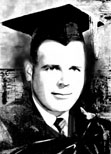 As the Ford Fellow he
met and worked with vice-president Richard Nixon, California governor
Goodwin Knight, and U.S. Senator William F. Knowland.
As the Ford Fellow he
met and worked with vice-president Richard Nixon, California governor
Goodwin Knight, and U.S. Senator William F. Knowland.
Born to a middle-class family, Hobbs was schooled in the United
States and in Japan. He served in the U.S. Marines in Japan
at the close of Korean conflict.
Before completing Fresno State College, where he was honored with
the Ford Fellowship, he distinguished himself in debate, was the
college editor of the Bulldog News, and distinguished himself
as a Shakespearean Hamlet in his Little Theatre appearance. Dr.
Phillip Walker said of Hobbs, "Howard is the greatest actor
in the history of Fresno State!"
Hobbs would later complete doctoral study at the University of
Southern California, with his dissertation on moral philosophy.
By1959 Hobbs acquired ownership of the historic Fresno Republican
Newspaper founded in 1876 by A. L. Hobbs and Chester Rowell. Its
circulation grew rapidly under Hobbs' editorship, and by
1996 it became the country's leading Conservative journal.
He began writing a syndicated political column. In 1998,
that would eventually appear in many national newspapers. Since
1986 his many journal articles on politics and public affairs
include economic political analysis of the news. He has also written
several accounts of his Marine Corps tours of duty.
Send all story submissions thru secure E-Mail at:
editor@fresnorepublican.com
Mailing Address:
Editor,
Fresno Republican Newspaper,
Corporate Mail Service
34 West Minarets Street
Palm Bluffs, No. 3246
Fresno, California 93650
[Telephone/Fax - 559.298.9439]
Fresno Daily Republican Mailing Address:
E-Mail Address:editor@fresnorepublican.com
World Wide Web Mission Statement:
'We are compassionate of heart and conservative of mind. Established
in Fresno., in 1876, the Fresno Republican Interactive
is now commemorating its 174th Anniversary. We publish a fearless,
National print and electronic daily newspaper, on-line via the
Internet WWW serving readers across the Nation and in 140 countries.
The Daily Republican sponsors original research on government
policy, the American economy, and American politics. Daily Republican
research aims to preserve and to strengthen republican foundations
of a free society—limited government, competitive private enterprise,
vital cultural and political institutions, and vigilant defense—through
rigorous inquiry, debate, and clear writing.'
[Bibliographic Primary Sources: FRESNO REPUBLICAN.
General directory of Fresno County, California for 1881. Containing
a description of the County, its topography, resources, history,
etc. Sketches of its towns, settlements, industries and business
houses. Statistical tables, record of rainfall, lists of public
officials; together with a complete list of names of the adult
population. Fresno: Fresno Republican, 1881. CH Fre 1882 History
of Fresno County, California, with illustrations, descriptive
of its scenery, farms, residences, public buildings, factories,
hotels, business houses, schools, churches and mines, from original
drawings, with biographical sketches. San Francisco: Wallace W.
Elliott and Company, 1882; Fresno Morning Republican et al. archives
1877-1923, Victor Bogart, "Chester Rowell and the Lincoln-Roosevelt
League," (Unpublished M.A. Thesis, Berkeley, CA., 1962), 54; The
Story of an Independent newspaper: One Hundred Years of the
Springfield Republican 1824-1924, by Richard Hooker, The MacMillan
Co. New York, 1924; Solomon B. Griffin's People and Politics;Allan
Nevins, The Evening Post, A Century of Journalism; and
American Political History by Alexander Johnston &
James Albert Woodburn; Irving Babbit's Democracy & Leadership,
Houghton Mifflin, Boston, 1924; The Columbia Encyclopedia,
2d ed., pp. 237, 1876, Columbia University Press, New York, 1956;
Edwin M. Eaton's Vintage Fresno: Pictorial Recollections of
a Western City, pp.6-9. The Huntington Press, Fresno, California,
1965; Verne E. Edwards' Journalism in a Free Society, Wm.C.
Brown Pub., New York, 1970; Elizabeth Grey's The Story of Journalism,
Houghton Mifflin, Boston, 1969; Leonard W. Levy's Legacy
of Supression: Freedom of Speech & Press in Early American
History, Oxford Univ. Press, New York, 1960; Frank L. Mott,
American Journalism, A History 1660-1960, pp. 265-265,
Macmillan Co., Toronto, 1971; Alexis de Tocqueville's, Democracy
In America(1835), Alfred Knopf, New York, 1945.]







![]()
![]()
![]()



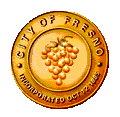
![]()


